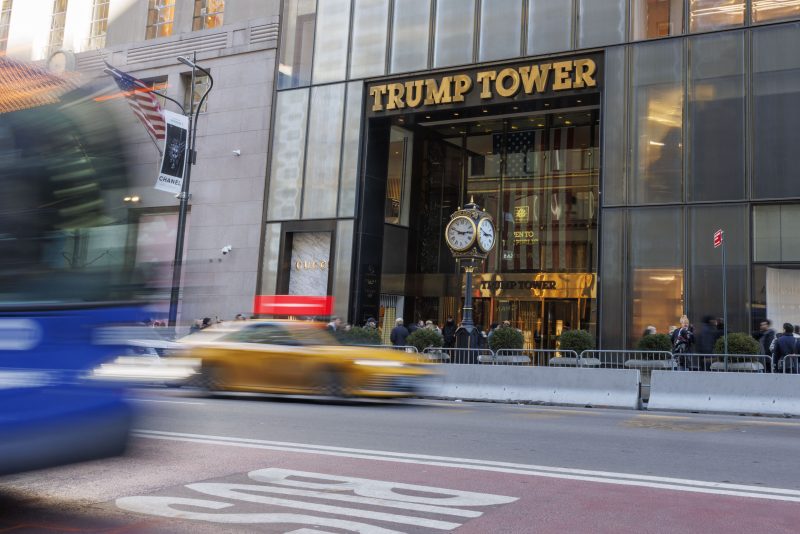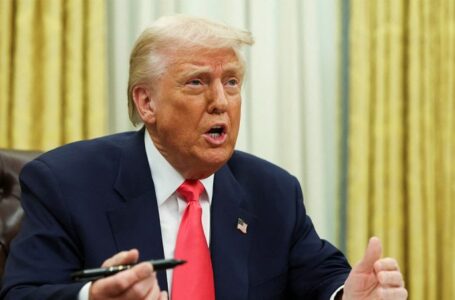Trump ‘hopes’ Putin agrees to ceasefire as Moscow signals no truce yet
Hefty fines, penalties will rock Trump family’s business and fortune


For more than 100 years, since Donald Trump’s grandfather started buying land in New York City, the Trump family has run a real estate business in New York.
Barring a successful legal appeal of Friday’s decision by a New York Supreme Court judge, that could change.
In his ruling on a months-long civil trial brought against Trump and his business by New York Attorney General Letitia James (D), Justice Arthur F. Engoron prohibited Trump from serving as an officer or director of any New York firm for three years. He barred Trump’s elder sons, Donald Trump Jr. and Eric Trump, from doing so for two years.
Trump’s eponymous company, Trump Organization, is already operating without a chief financial officer or a controller, according to the ruling.
“There is no one at the financial helm. There’s no CFO, no controller, and now you don’t have Eric Trump, Donald Trump Jr. or Donald Sr. running it,” said Boston College law professor Brian Quinn.
Whoever takes over the company will face a host of challenges in the short term.
After finding that Trump Organization executives had engaged in years of fraud by inflating their property values to get better insurance and tax rates, Engoron ordered that the company operate under the close eye of two overseers, a monitor and an independent director of compliance, to ensure compliance with financial reporting obligations.
In other words, Trump can remain the owner, but he has lost control.
The ruling also bars a number of the company’s units directly implicated in the ruling from seeking loans from any financial institutions registered in New York state for three years. That includes entities affiliated with the company’s office building at 40 Wall Street and its hotel in Chicago, as well the Trump Organization itself.
There are enormous fines and penalties to pay, provided they, too, are not overturned on appeal. Engoron ordered Trump to pay $354 million in penalties for ill-gotten real estate deals, such as the sale of his luxury D.C. hotel, a figure that the attorney general’s office calculated at nearly $100 million to match the interest Trump has earned on those profits since May of 2022. His adult sons were each ordered to pay more than $4 million — an amount equal to profits they made on the sale of the D.C. hotel — while the Trump Organization’s former financial chief was ordered to pay $1 million.
Since entering politics, Trump — who is again running for the White House and is closing in on the Republican presidential nomination — has moved some of his wealth out of real estate developments and into more liquid, cash positions, according to financial filings he’s made with the government.
Bloomberg Billionaires Index recently estimated Trump’s net worth at $3.1 billion, with about $600 million in cash assets. The fines and penalties levied by Engoron could eat into well over half of that fortune, accumulated over many years, and could prompt the company to sell more real estate if it wants to free up cash. Last year, Forbes downgraded its estimate of the former president’s net worth to $2.5 billion, $600 million less than its previous estimate.
“The financial penalties that are being placed on Trump and the Trump Organization are likely to put serious strain on Trump’s business in a way that hasn’t happened to date,” said New York Law School adjunct professor Steven M. Cohen, a former top official in the New York attorney general’s office, citing Friday’s decision and the recent $83.3 million verdict in E. Jean Carroll’s defamation lawsuit.
Cohen said Trump would have to post a bond covering full amount he owes in penalties and interest before he appeals Engoron’s ruling. The recent verdicts, he added, are “the one-two punch that I think are going to begin causing real problems” for Trump’s family business.
In response to the ruling, Trump wrote on Truth Social, his social network site, that the penalty amount was “outrageous” and that it was “based on nothing other than having built a GREAT COMPANY.” Clifford S. Robert, at attorney for the two elder Trump sons, called the decision “gross injustice” and said he was confident it would be overturned on appeal.
Trump still has the ability to make lots of money, not only through the golf courses, hotels and resorts that he operates but through speeches and other promotional businesses. A Washington Post review last July showed earnings of about $1 billion since his presidency ended. And on Thursday, the parent company of Truth Social won a key merger approval, which could give Trump a stake worth nearly $4 billion based on recent stock values.
A silver lining for Trump on Friday was that Engoron vacated his own earlier order to cancel all of Trump’s business “certificates” in the state. Had that order, which was already stayed by an appellate court, been enforced, experts said, Trump would have had to sell or transfer his marquee New York properties, including Trump Tower.
The former president did not say Friday who would lead his company should Engoron’s ruling stick, forcing out Trump’s son Eric, who has been running the Trump Organization since 2017. Donald Trump could turn to other Trumps to keep the company in his family’s hands. His daughter Ivanka was a senior real estate executive before she left business for politics. Her husband, Jared Kushner, has real estate experience. Perhaps Donald Trump’s wife, Melania, the former first lady, would want to give it a go.
Otherwise, Quinn said, the company may have to evolve away from the model that brought it success and notoriety for generations.
“This is going to be a business that will look very different,” Quinn said. “It won’t be a family-run business. It can be a family-owned business, but it won’t be a family-run business for the next several years.”
Shayna Jacobs in New York contributed to this report.











